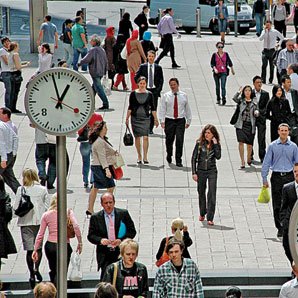City Life Vs. Suburban Life : Which Environment is Better for Your Household ?
The city or the suburbs? Which is right for you and your family? Each has pros and cons. Discover some of the benefits and drawbacks of each.
Choosing a Home Site
Choosing whether to live in the city or living in the suburbs can be simple for some people and agonizing for others. Both areas have their draws, just as both have drawbacks. Historically, the cities have attracted, young, unmarried adults or childless couples and empty nesters, while the outer ring of towns have been the domain of families. But the times are changing. More and more families are finding that urban living offers a quality of life that they cannot achieve in the suburbs, just as many young adults are choosing to live and work in the suburbs.
Deciding which environment is right for you and your family is a personal decision. It may come down to practicality or cost or it may be that you end up wherever the house you fall in love with happens to be located. Whatever your choice you’re sure to find a variety of homes to meet your needs in both locations.
Urban Amenities
Living in a city brings many opportunities. Cities generally have a vibrant feel and diverse population. Though cities are most often associated with apartments, condos and lofts, you can find single-family homes and townhouses in some cities.
If you work in the city and are interested in an easy commute or perhaps want to use public transportation rather than own a car, you may want to live downtown. Many dual-income families are being drawn to cities for this reason. A shorter commute means more family time.
It has been argued that living in cities makes your carbon footprint smaller. In a city you don’t necessarily have to own a car to get around. Shops, housing and entertainment are clustered closer together and the square footage of your living space is usually going to be smaller than that found in the suburbs.
If you’re not interested in maintaining a property and yard but are content to rent, urban life may be a better choice. Apartments are more plentiful there and generally require no maintenance upkeep on your part. Condos and co-ops may have maintenance fees assessed but that simply means you’re paying ahead of time for someone else to do the upkeep on the property.
If you want to be close to the arts, museums and other entertainment and cultural venues or you love people and the commotion they create, the city is going to be a better choice for you.
Drawbacks to Living in the City
Just as there are many draws to urban life, there are several drawbacks.
- Cities are generally busier, more congested and louder with higher crime rates than the suburbs.
- With so many people, cities can leave you with feelings of a lack of privacy.
- Sometimes it is hard to find parking if you own a car. Even if you do find parking, it can be costly to park in the city.
- It can cost more to live in the city. It can also cost less or be the same, it depends on the city and your choice of housing and whether or not you send your children to private schools.
- Cities do not have as much open space as the suburbs and the open space they do have is public space that must be shared with others. If you value having a yard and private green space, urban life is probably not for you.
Suburban Amenities
The suburbs personify the “American Dream:” your own single-family home, complete with two cars in the driveway, safe neighborhoods and high-quality schools. There’s a reason life in the ‘burbs is so popular. Many people enjoy having room to spread out, having a private yard and their own property. It’s easy to visit the city when you want to, but you are still able to leave and go back to the relative quiet of the smaller towns. Suburbs are generally safer than cities and the cost of living tends to be less.
Today, suburbs are giving cities a run for their money. More and more employers are locating to the suburbs, which means homeowners are not necessarily commuting to the city. Many towns are making efforts to expand their cultural offerings too with community playhouses and “concerts in the park” becoming popular among residents.
Like the city, you’ll have your choice of housing in the suburbs. You can rent apartments, condos or townhouses and, of course, you will have plenty of single-family homes to choose from.
Suburbs give you more house and land for the same amount of money in many cases. People who love to be outside and envision themselves raising a garden or hanging out in the backyard will be drawn to the suburban way of life. Many people are drawn to the suburbs for their neighborhoods and the community connection a suburb can provide.
One of the major draws to these communities is the school system. Suburban school systems are generally viewed as being better than city school systems, offering more amenities and activities, higher test scores, and a higher percentage of kids who graduate and then go on to college.
Suburban Drawbacks
Still, for all their lure, the suburbs are not for everyone. Some of the major drawbacks :
- The suburbs are so spread out, with amenities scattered all over that residents must own a vehicle. The added cost of a vehicle or two can up the cost of living in the suburbs compared to the city.
- Public transportation systems are sorely lacking compared to cities or completely non-existent, in many cases.
- Suburban homes are for the most part, owner-occupied. This means, you are responsible for all interior and exterior upkeep and maintenance of the property. Yards require mowing. Driveways need to be shoveled and homes need to be maintained. Depending on your suburb, you may even face some hefty fines from the city for allowing the property to fall into disrepair. If you’re not interested in home maintenance, you will want to re-think purchasing a property. Renting may be a better option for you.
- The larger properties may also result in higher maintenance costs than you’d face in the city.
- It can cost more to live in the suburbs, especially if you need to commute to the city for work. You’ll be paying for a vehicle, its maintenance, parking costs and gas. Living in a home with a yard requires you to purchase yard tools. You’ll soon find that two-car garage piling up with snowblowers, shovels, lawn mowers and assorted yard necessities.
Every family’s living situation is unique which is why choosing where to live is a personal decision. Cities and suburbs both have their pluses and minuses. It’s up to you to decide which one is the better for your family.






I would rather live in the suburbs… Going to school meeting someone you like knowing they live somewhere near you and its much easier to meet up and hang out somewhere…But the city you could have people from the north, east, south, west… The person you like could be on the other side of the city from you. Meeting up is always troublesome and your parents always telling you watch out for crazy people and car barley ever see grass unless its the park. I would love to move to the suburbs anytime…
I live in the suburbs and its not all its hyped up to be. Honestly I wish I lived in the city, but my city is Portland Oregon so the downtown's actually nice with plenty of green space and good schools. The suburbs make it so you live in your car and people are isolated. People live far away from each other as well and go to the same school, up to two hours away. The lack of community leads to depression and a lack of activities leads to kids either spending all their time inside or smoking weed.